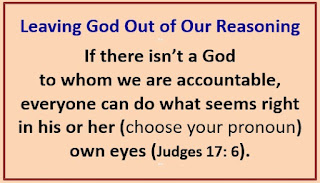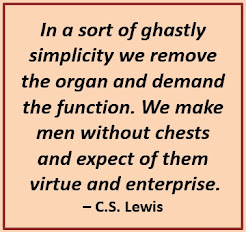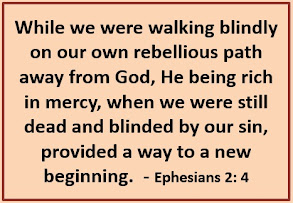You are being unreasonable!
Have you lost your sense of reason?!
Very likely, we’ve all heard expressions like these. Maybe they were directed at us. And, if we were being “unreasonable” in our
communication, maybe we deserved them.
Just when we thought we were being perfectly reasonable, we ignited what
became a firestorm of misunderstanding and conflict. How many times have you “been there and done
that?”
Who Is Reasonable?
Wouldn’t you agree that we are, at least sometimes, unreasonable? But there’s a much deeper significance to this
claim. We are not only unreasonable; we
all possess a corrupted sense of reason! This claim may sound too extreme. And, we may not want to hear it. But it is true. The “reason” it is true comes from the
highest possible authority— from God Himself!
But, some will ask, “How do I know God exists?
And even if He does exist, why should I trust Him to define ‘my truth’
or ‘my reality?’” Or, “What right does
God have to dictate how I identify myself—whether as saint or sinner, boy or
girl, man or woman, dog or cat?” Bottom
line-- does God get to define my truth and reality, or do I?
Today, more and more people are thinking and speaking as if God doesn’t exist. It follows that if there isn’t a God to whom
we are accountable, everyone can do what seems right in his or her (or
choose your own pronoun) own eyes (Judges 17: 6). It is clear that when logic and reason fail, and
when there is no belief in absolutes, the field becomes ripe for disagreement,
anger, and even violence. Add to that
the growing disrespect for authority and judicial accountability and the dry
tinder of selfish pride and autonomy can ignite into social chaos.
On the other hand, if God does exist, He has the right as our Creator to define
truth and reality. And, if His Word expressed
in the Bible is true, then we have an objective framework (not subjective)
within which to reason and understand the truth. Without this reference point, we are
accurately described as “unreasonable.”
The Origin of Reason
What is the origin of true reasoning? The
ancient Greeks gave us the word, logos. To them, the logos meant what we now
refer to as logic. Heraclitis
(535-475 BC) defined logos as the cosmic principle and ordering force or
“current” that accounts for the operation of the universe. As Matthew Boffey wrote,
“The world exhibits order because it reflects the nature of the logos
that structures it.”
C.L. Johnstone wrote in his book, Listening to the Logos: Speech and the
Coming of Wisdom in Ancient Greece (2009), “The logos is to the world (kosmos)
as law (nomos) is to the city.”
Both represent the underlying basis that “gives an account” for the
observed order. It follows that reasoning
leads to the truth when consistent with the logos which gives an account
for the order of the universe; such reasoning is “logical.”
Both Heraclitus’s and Johnstone’s concept of logos was predated many
centuries by the writings of King David (1040-970 BC), the great Hebrew
shepherd, warrior, writer, musician, and king.
David was inspired to write Psalm 19 which is divided into two major
parts. Verses 1-6 directs us to the
marvelous order and beauty of the universe which are “declaring the glory of
God” and which “show forth His handiwork (v. 1).” David seems to recognize that there is some
underlying principle of which the order and regularity of creation is an
outward expression.
The remainder of Psalm 19, seemingly by analogy, points to “the law of the
LORD” which is pure, makes wise the humble, protects him from great
destruction, and gives order and purpose to the obedient follower. Message:
God is the Author of physical order in the universe and of moral order
for wise living. But if this message is
true, and if God is Holy, how do we account for the existence of the
“il-logic,” the “un-reasonable,” and the resultant evil and darkness that is
descending upon the world? Romans 3:
10-12 states,
There is none righteous, no, not one: There is none that understands,
there is none that seeks after God. They are all gone out of the way,
they are together become unprofitable; there is none that does good, no, not
one.
The Death of Reason
In Romans 1: 18-20, God’s Word explains of how we lost our reason. You may wince at even the thought of this sad
account. Indeed, the razor-sharp truth
about us in the biblical account pricks our flesh where our pride resides. Here are the main points of the moral
framework of God’s Word:
1) God revealed the truth about Himself…. (v, 20)
a) His invisible attributes
b) His eternal power
c) His divine nature
2) His righteous personhood is reflected in (v. 19)
a) our human personality as His
image-bearers
b) our sense of reason
c) our conscience
3) God reveals His wisdom through the logos of Creation
(v. 20).
4) But our human response to all of this is to
a) dishonor God as God (v. 21)
b) show our unthankfulness (v. 21)
c) suppress His truth (v. 18)
d) cause foolish speculation about
what is truth (v. 21)
5) …and the result is
a) mankind, in professing to be wise,
became fools (v. 22)
b) our hearts are darkened, lacking
the light of God’s reasoning
c) we suffer natural consequences of our disobedience (v. 24-31).
d) we invite and encourage others to
partake of our sin (v. 32).
Parts 1 to 3 of the above outline includes the revelation of God’s character
and an account of His created order. In
contrast, Part 4 outlines the progression of the human response, beginning with
our choice not to “honor God or give thanks.”
Dishonor has led to denial of God’s truth; then, to suppression of
truth; and finally, to denial of the existence of objective truth.
Once we yield to the progression of dishonor and denial, Part 5 outlines our
final descent to darkness. First, we are
deceived and deluded, thinking we are wise when we are actually fools. Our deception—not knowing truth and not
knowing that we don’t it—we are described as having “vain imaginations” and
“foolish, darkened hearts.” We are
blinded to the “light” of God’s truth and reasoning. Once we are in this spiritual condition,
God’s judgment falls upon us in the form of allowing us to suffer the
consequences of “going our own way (Romans 1: 24, 26, 28).”
“Men without Chests”
Until recent years, we addressed major challenges and solved them with
well-reasoned and respectable debate.
But today, in spite of abundant scientific knowledge, almost
instantaneous online communication, and great economic and social advancement,
we have never been more divided. We
argue endlessly over issues without respect for differing opinions or
long-established truth and logic. And
why not, considering that there can be no logical discourse if moral relativism
overrides belief in objective truth.
As a consequence of our denial of God’s truth and a respect for His moral and
created order, the distinctions that were once clear to us are now blurred or
erased whether they are biological (e.g. gender confusion), political (e.g.
national boundaries), constitutional (e.g. citizenship, individual
rights), judicial (e.g. “two-tiered justice”), historical (e.g. Is
America exceptional?), and ontological (e.g. Am I a human or a cat?).
In his book, The Abolition of Man1
(1943), C.S. Lewis predicted that denial of absolute truth “would lead to the
decay of morality and a lack of virtue within society. Without a belief in and the teaching of
universal moral laws, we fail to educate the heart and are left with
intelligent men who behave like animals or as Lewis puts it, ‘Men without
Chests’ (C.S. Lewis Institute).”
Gone are the virtues that derive from the fruit of God’s Spirit when He is
allowed to work in spiritually healthy “chests:” love, joy, peace, patience,
kindness, goodness, faithfulness, gentleness, self-control...(Galatians 5:
22-23).
In sharp contrast, God’s Word describes in unbridled detail the attitudes and
behaviors of “men without chests” as those being filled with all
unrighteousness, wickedness, greed, evil; full of envy, murder, strife, deceit,
malice; they are gossips, slanderers, haters of God, insolent, arrogant,
boastful, inventors of evil, disobedient to parents, without understanding, untrustworthy,
unloving, unmerciful; and although they know the ordinance of God, that those
who practice such things are worthy of death, they not only do the same, but
also give hearty approval to those who practice them (Romans 1: 29-32).
Second Peter 2: 10-12 compares those who indulge the flesh in its corrupt
desires and despise authority… as being …like unreasoning animals,
born as creatures of instinct to be captured and killed, reviling where they
have no knowledge… How is it
possible for humans to be so “unreasonable” and blinded to truth, order, and
righteousness? Again, Lewis describes
the deplorable spiritual state of morally lawless “men without chests:”
And all the time—such is the tragi-comedy of our situation—we continue to
clamour for those very qualities we are rendering impossible… In a sort of ghastly simplicity we remove the
organ and demand the function. We make
men without chests and expect of them virtue and enterprise. We laugh at honour and are shocked to find
traitors in our midst. We castrate and
bid the geldings be fruitful.1
It ought to be obvious from observation of our world as we described it, and
also the biblical references and our quotes from more recent authors like C.S.
Lewis that something is deeply wrong. Having
rejected God’s truth and the revelation of His character through His creation
and through His Word, all of us deserve condemnation. Whether or not we agree with the verdict,
God’s verdict trumps ours. God declares
us unreasonable people who are walking in darkness (1 John 2: 11)!” But thankfully, God doesn’t leave us without
reason and grappling in darkness.
“Reason for Life”-- in Human Form
We conclude this admittedly depressing Part 3 of “Reasoning for Life”
with a very positive reminder. That is,
Part 1 of this series, “Before There Was Any Thing” (Click HERE to
read) explains how God’s Son, Jesus Christ, the Logos, “reasoning for
Life,” came seeking us. While we were
walking blindly on our own rebellious path leading away from God, He being rich
in mercy, when we were still dead and blinded by our sin, provided a way to a
new beginning (Ephesians 2: 4). We can
be “born again” into “a new creation” (2 Corinthians 5: 17) through faith in
the death and resurrection of His Son, Jesus Christ.
What’s even more amazing is that when Jesus Christ, the Logos, came into
His creation through His incarnation, He was rejected by His own people including
each of us living today. Although Christ
made everything to “fit together” in perfect “fit-ness,” He was rejected as
being “un-fit” and was eventually crucified.
Part 2 of “Reasoning for Life, “The Creator of “Fitness” Didn’t Fit”
(Click HERE.),
describes this amazing entry of Jesus Christ, the “Light of the World,” into
our spiritual darkness, and how the darkness did not overcome it.
What
Next?
Do you have a personal relationship with Jesus Christ, the Logos of God,
the “Reasoning for Life?” We have
discussed how He existed “before there was any thing” (Part 1)
and how He came into this dark world as God’s Messiah. But as Creator of fitness, Christ didn’t fit
because, this sin-darkened world of unreasonable people rejected Him (Part 2). They were blinded to the Truth He came to bring.
Only by the power of Christ’s death and resurrection can we receive the
faith to believe and become born again in His likeness, and members of His
body, the true church of Christ.
In Part 4 of “Reasoning for Life,” entitled, “Light Shines in Darkness” (Click HERE.) we
plan to use the Apostle John’s metaphor of light and darkness to distinguish revealed
truth from error, and spiritual life from spiritual death as we feature John’s
account of Jesus healing the man who was blind from birth (John 9).
Care
to Comment?
Meanwhile, you may have read this article and are left with a sense of
confusion, uncertainty, and even fear.
If you have never encountered the “Good News” or Gospel, let us help. The “Good News” is summarized in an outline
called “Steps to Peace with God” (Click HERE.) which
explains God’s love, our predicament (sin and separation from God), what Jesus
has done to address our predicament, and what you can do by faith to receive
God’s righteousness (right standing with a Holy God). If you have additional questions or comments,
we’d love to hear from you. Just post a
“Comment” below or e-mail to silviusj@gmail.com
---------------------------------
1 C.S.
Lewis, The Abolition of Man (New York: Touchstone, 1996), pp. 35–37.






